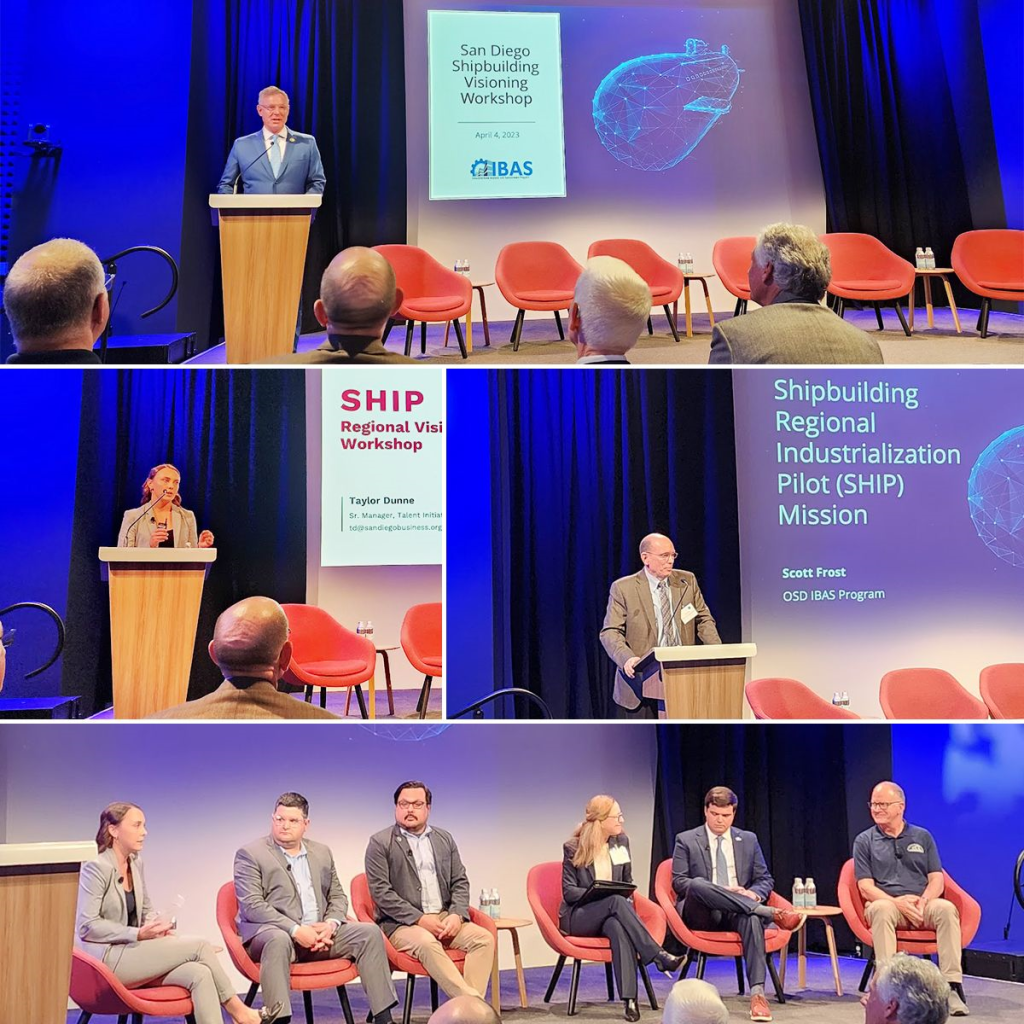This is a developing story; last update was made May 2024.
In April 2023, San Diego Regional EDC and its partners hosted the Shipbuilding Regional Industrialization Pilot (SHIP) Regional Visioning event at UC San Diego Park & Market.
The day-long workshop was the first part of a multi-state effort to understand unique regional challenges facing the nation’s defense industrial base. Critical partners in the effort included a Navy Program Executive Office (PEO SSBN), California Manufacturing Technology Consultants (CMTC), Port of San Diego Ship Repair Association (SDSRA), the Office of Congressman Scott Peters (CA-50) and more. The day’s speakers included Congressman Scott Peters, Scott Frost at Industrial Base Analysis and Sustainment (IBAS); Jess Key, Manager of Supplier and Workforce Development at Electric Boat; Gordon Rutherford, President of SDSRA; Kyle Turner, Program Manager at PEO SSBN; and a panel discussion with members of industry.
The SHIP Regional Visioning event gathered diverse industry, education, policy makers, and civic leaders’ perspectives on critical priorities for the shipbuilding industrial base, including:
- Industrial base workforce
- Technology and innovation
- Strategic outsourcing
- Data analytics and proactive risk management
- Material readiness and sustainment
- Supply chain infrastructure and engagement
ABOUT THE SHIP PROGRAM
In collaboration with the Navy, the U.S. Department of Defense’s (DOD) IBAS program office launched the SHIP program to help regions address supply chain and workforce gaps across the defense shipbuilding industry. IBAS selected the Texas A&M Engineering Experiment Station’s SecureAmerica Institute to deliver data-driven and relationship-based roadmaps to scale and deploy regional workforce and technology adoption solutions that simultaneously support the near-term and future needs of the shipbuilding industrial base.
In addition to San Diego, these efforts are also taking place in the New England and Great Lakes regions. In each region, the Regional Visioning workshop is followed by series of deep dives into topics that arose during the workshop, as well as a Threatcasting activity.
The SecureAmerica Institute then delivers key event takeaways, as well as investment and solution recommendations, to the IBAS team.
TALENT FLOW ANALYSIS FINDINGS
IBAS, SecureAmerica Institute, and other implementation partners rely on regional champions and local experts to help guide their understanding of each region. At the SHIP Regional Visioning event, San Diego Regional EDC presented preliminary findings from its ongoing Talent Flow Analysis project in collaboration with San Diego’s major defense industrial base employers over six months.
What we learned: Poor communication between regional industry leaders and education partners drives a mismatch of talent supply and demand, exacerbated by a lack of shared strategy around industry recruitment efforts.
Additionally:
- Long-term, there is shrinking interest in the skilled trades. Improved demand signaling, as well as employer engagement in career exploration at the K-12 level could open doors for more young people to be trained in the skilled trades.
- DOD contracting methods and San Diego’s high cost of living continue to put pressure on the existing talent pipeline. This incentivizes talent to transition to different skilled trades-reliant industries or move outside the region altogether.
SHIP REGIONAL VISIONING TAKEAWAYS
During the event, breakout groups with equal representation from each group of participants (industry, education, policymakers, and civic leaders) covered the critical topics listed above in three separate phases:
- Obstacles: What are the consistent themes that are driving the challenges in the area? Groups saw consistent obstacles with awareness and perception, cost of living and compensation, skilled manufacturing workers, contracting and supplier support, and inconsistent demand signaling.
- Enablers: What entities exist that play a critical role in addressing the identified obstacles? Groups identified education and training programs, marketing and communication initiatives, technology incubators, and government and policy support as enablers.
- Resourcing: What resources could be adapted, scaled, or started to tackle the identified challenges? Conversations centered around workforce education, training, and recruiting program areas. Some also highlighted supply chain, policy and economic, and infrastructure program areas.
 Taking Action
Taking Action
By the summer of 2023, the SHIP team assembled a roadmap and presented investment recommendations based on the data collected. EDC convened key partners including San Diego Workforce Partnership (SDWP), San Diego/Imperial Counties Community College Consortium, San Diego/Imperial Center of Excellence for Labor Market Research (COE), East County Economic Development Council, and California Manufacturing Technology Consulting (CMTC) to submit five white papers indicating how funds could be deployed in the region to achieve the investment recommendations made by the SHIP team. The collaborative anticipates we will receive information about regional investments into new and existing programming by the end of Summer 2024.
In the meantime, EDC, through support from BlueForge Alliance, is conducting an employer working group that builds on the original Talent Flow Analysis project. This group will produce workforce demand data looking into 2025 and help local partners understand what interventions will be most useful in strengthening the talent pipeline of skilled tradespeople into defense industrial base companies. The results of the working group will be available in June 2024, in conjunction with the release of funding.
Interested in getting involved? Please reach out to Director of Talent Initiatives Taylor Dunne for more information.
You might also like:
- Resources for recruiting and retaining talent in San Diego
- What the National Defense Authorization Act means for San Diego
- Rady Children’s Hospital hires six FTEs following Advancing San Diego internship

Taylor Dunne
Director, Talent Initiatives